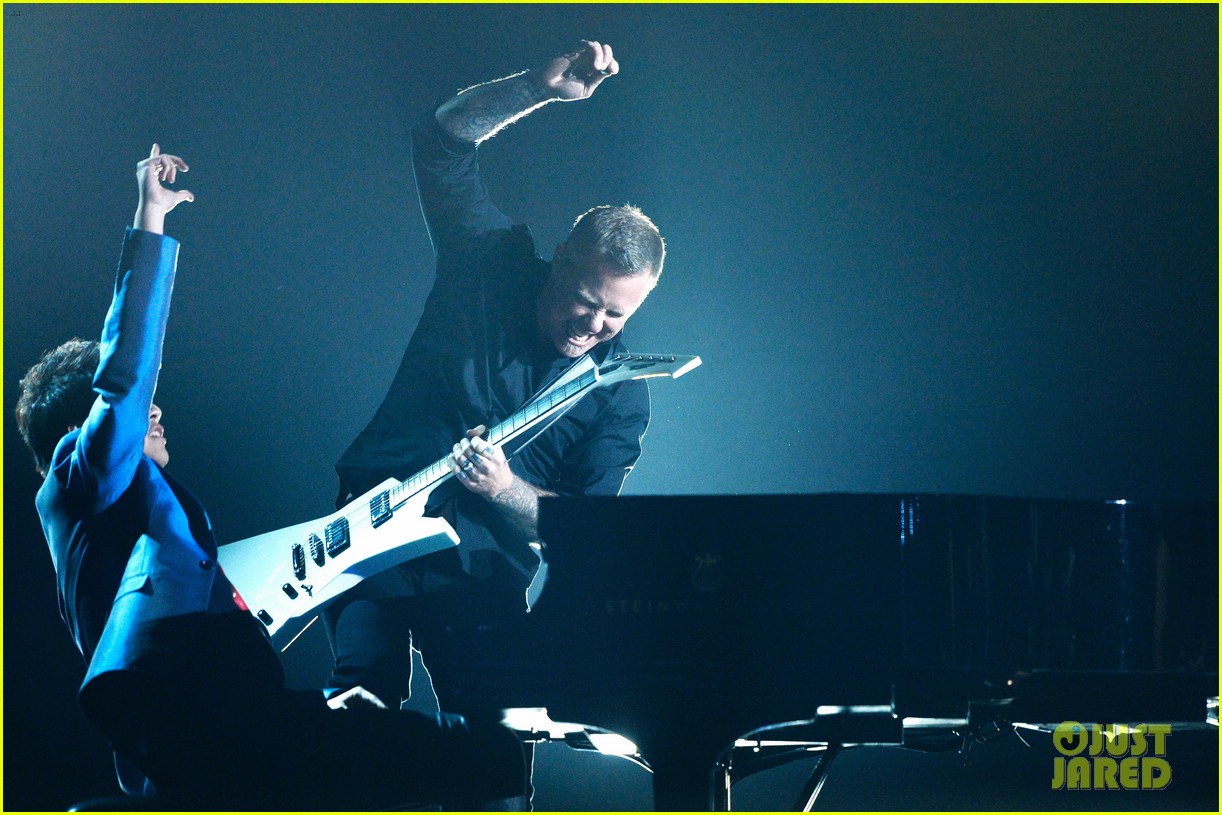Last sunday, Lang Lang played, inexplicably, with Metallica at the Grammys. Tonight–out of all the singers and lip-synchers in the land–Renée Fleming will sing the national anthem at the Super Bowl. A great or terrible week for classical music, depending on how you slice it, but it remains that, in any industry, there is usually one person, sometimes a handful, whom the wide world knows “of” without knowing much more about the pursuit from which that one or two people come. Baseball? If you think baseball players can score touchdowns and get penalties, you’re still going to know who Babe Ruth is. Basketball? Michael Jordan. Ice-dancing? Torvill and Dean. Tiger Woods, Baryshnikov. Stephen Hawking, Marie Curie, Charlie Chaplin, Bill Gates, Steven Spielberg, David Beckham…those people. It bears mentioning that I can only name one football player, Peyton Manning, playing in the Super Bowl tonight.
When the recording of my client Gabriel Kahane’s musical February House came out last year, I was obsessed with getting someone to write about the songs in musicals that have become part of the mainstream. (No one did, for those of you playing at home!) We haven’t seen it recently, I think because so many musicals are using existing pop or rock material from which to string together a musical (Jersey Boys, Mamma Mia!, Fela!, Beautiful: the Carole King Musical, Baby It’s You, Million Dollar Quartet, Love – Janis, The Times They Are A-Changin’, Rock of Ages, The Boy From Oz, Movin’ Out, Come Fly Away, All Shook Up, Forever Plaid, Once, American Idiot). Even songs from contemporary musicals written in pop, rock, “indie rock,” or emo styles (Rent, Spring Awakening, Bloody Bloody Andrew Jackson, Murder Ballad, Hedwig and the Angry Itch, Next to Normal) haven’t gotten radio play or–more appropriately for our post-radio-as-we-knew-it time–been covered by mainstream artists disconnected from the musical theater world. The closest we’ve come recently is Gwen Steffani essentially sampling “If I Were a Rich Man” from Fiddler on the Roof in her song, “Rich Girl.” Stevie Wonder recorded “Seasons of Love” on the original Broadway cast recording of Rent, but I don’t think it made it to radio.
“Audition songs,” I like to call them, work plot-wise in a musical and can be completely extracted from it. George Gershwin and Cole Porter, who wrote songs that could be on the radio–in fact, that were on the radio before they were on a stage–in a way wrote the ultimate “juke box” musicals, because their songs could be mixed and matched in different musicals. Pippin, that opened on Broadway in 1972, had three songs that were recorded performed by popular, to say the least, artists. Here we have Jackson 5 singing “Corner of the Sky”; their recording of “Morning Glow” and The Supremes’ version of “I Guess I’ll Miss the Man” are on the original Broadway cast recording. The Supremes also did an entire Funny Girl album in 1968, go figure. “Send in the Clowns” from Stephen Sondheim’s A Little Night Music was a huge hit for Judy Collins in 1975, after Frank Sinatra had already recorded it in 1973, the year Night Music opened on Broadway. History has also provided us versions by Cher and Susan Boyle. “Send in the Clowns” is arguably the most famous Sondheim song, from one of the least famous Sondheim musicals; the popularity of the song did not make A Little Night Music a household name or a commercial slam-dunk. Similarly, “Till There Was You” is probably the most well-known song from any musical, ever, because The Music Man, from 1957, is so popular? No, because The Beatles recorded it in 1963. How many people actually know it’s from a musical? Hair, which opened on Broadway in 1968, is in a slightly different category because it was a “rock” musical, has two famous songs, and generally, people know they’re from Hair. “Good Morning Starshine,” and “Let the Sunshine In” were recorded by The Fifth Dimension in 1969.
What, then, are the boundaries of the crossover? Lang Lang and Renée Fleming’s mainstream performances this week aren’t going to do much for the so-called Classical Music Industry long-term, and that’s probably not the point. Sure, a few more people may buy tickets to Lang Lang’s Carnegie Hall recital on Tuesday, or go to a Rusalka performance at the Met this month (it’s just “The Little Mermaid”! Tell everyone you know!), but overall, any one TV performance, no matter how great the scope, isn’t going to fix the general public’s view of classical music in a “we did it!” way, just as Judy Collins having sung “Send in the Clowns,” I’m sure, didn’t sell many tickets ticket to the recent A Little Night Music revival. And if it did sell tickets, how many people left the theater humming other songs from Night Music? Katy Perry isn’t going to cover “The Miller’s Son” this week, I don’t think.
We acknowledge that these moments in mainstream spotlight are a big deal, but it’s hard to see how they’re something we should be aiming to engineer in artists’ careers. For those of us who love our art forms and want more people to know about them, should a major presence outside the niche be a goal? If so, what do we hope to accomplish by it?
But by all means, Renée, do us all proud tonight! Knock it out of the park! …erm…the stadium?


The songs from Hair that The Fifth Dimension recorded were “Let the Sunshine In” and “The Age of Aquarius”. A singer named Oliver was the one who made a hit out of “Good Morning, Starshine”.
(For what it’s worth, “Good Morning, Starshine” is the only one of those three I still hear playing in the supermarket.)